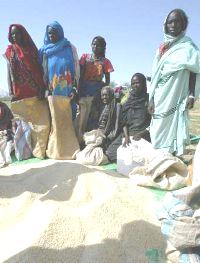Britain says fighting hindering Darfur relief
KHARTOUM, July 29 (Reuters) – Fighting in western Sudan in recent weeks has restricted aid access to the region where the United Nations says the world’s worst humanitarian crisis is unfolding, Britain’s ambassador to Sudan said on Thursday.
 “There have been increased problems with humanitarian access in recent weeks due to insecurity caused by continued fighting in key areas. Some of the main routes remain closed,” Ambassador William Patey told a news conference.
“There have been increased problems with humanitarian access in recent weeks due to insecurity caused by continued fighting in key areas. Some of the main routes remain closed,” Ambassador William Patey told a news conference.
Both Khartoum and rebels in Darfur, who took up arms against the government in early 2003, have accused the other of violations of a ceasefire signed in early April.
But Patey said the government had made good on its commitments to open up humanitarian access and facilitate the delivery of aid to Darfur, where the conflict has pushed more than a million people from their homes.
“We acknowledge that the government has worked hard to remove most of the obstacles to humanitarian assistance,” he said. The government made the commitments during a visit by U.N. Secretary-General Kofi Annan in early July.
British Prime Minister Tony Blair has not ruled out intervening militarily to try to resolve the crisis and is sending Foreign Secretary Jack Straw to the region next month.
The Sudanese government has announced that it has deployed 5,000 extra police officers in Darfur to restore security and protect the displaced communities but Patey told reporters that the measure was not having a perceivable impact.
“There has been much less progress then we would have wished. We would have wished for much greater signs on the ground that it’s having an impact, that security for the IDPs (internally displaced people) in camps has increased and security generally has increased,” he said.
Most of the displaced left their homes because of attacks on their villages by Janjaweed militias allied with the government against Darfur rebels. The United States and other Western countries have demanded the government disarm the militias.
